KARACHI: Pakistani delegation of experts has reached Beijing to participate in the three-day talks with the Asia Pacific Group (APG) of the Financial Action Task Force (FATF) starting January 21.
The global money laundering watchdog is holding face-to-face meetings ahead of its plenary session in Paris next month to decide Pakistan’s fate as the South Asian nation makes efforts to avoid blacklisting.
The Pakistani team headed by Minister for Economic Affairs Division, Hammad Azhar, will discuss the progress made on the implementation of 22 action points, out of 27, suggested by the global watchdog while the country claims to have complied with five.
The FATF working group technical team will review Pakistan’s 650-page report filed on January 8, 2020 in response to the 150 questions by the Working Group raised on the country’s initial progress report submitted on December 03, 2019 regarding the implementation of the 27-point action plan.
Pakistan is hopeful to win a ‘largely-compliant’ rating by FATF even if it does not make it out of the grey-list at the moment, which can buy the country more time for full compliance.
“Based on the results we have provided to FATF, we are optimistic. On majority of action items, we are complaint and have made reasonable and significant progress,” Mansoor Hassan Siddiqui, Director General of Financial Monitoring Unit (FMU) of Pakistan’s central bank, told Arab News last week.
In October last year, FATF gave Pakistan until February 2020 to make swift progress on the given action plan after observing that the country had only made “limited progress” to curb terrorism financing and money laundering.
Pakistan has amended its laws dealing with anti-money laundering proposing harsh punishment and enhanced financial penalties. Country’s suggested amendments in Foreign Exchange Regulation Act 1947 (FERA) and Anti Money Laundering Act (AMLA) 2010 were passed by the parliament are in process of being promulgated as law.
Pakistan is also taking steps to safeguard saving schemes against ill-gotten money and terror financing through promulgation of National Savings Schemes (AML-CFT) Rules, 2019.
“Pakistan has made substantial progress and is compliant to large extent but we are not fully compliant so far. In the upcoming plenary meeting that will be held in Paris we need three votes to avoid blacklisting that we have,” Muzamil Aslam, senior economists who is closely monitoring the developments, told Arab News. “We are not going to be blacklisted.”
Amid growing opposition from arch rival India, Pakistan has also enhanced its diplomatic efforts ahead of the next month’s meeting to avoid blacklisting especially the recent visit of Foreign Minister, Shah Mehmood Qureshi, to United States where he sought US support and hoped that the it would back Pakistan in the upcoming meeting.
“America will be the swing factor. If the US supports Pakistan on the progress we made against terror financing and terrorism, we can immediately move out of the grey-list to white,” Aslam commented.
Pakistani delegation in Beijing to face FATF review starting Tuesday
https://arab.news/2ttts
Pakistani delegation in Beijing to face FATF review starting Tuesday
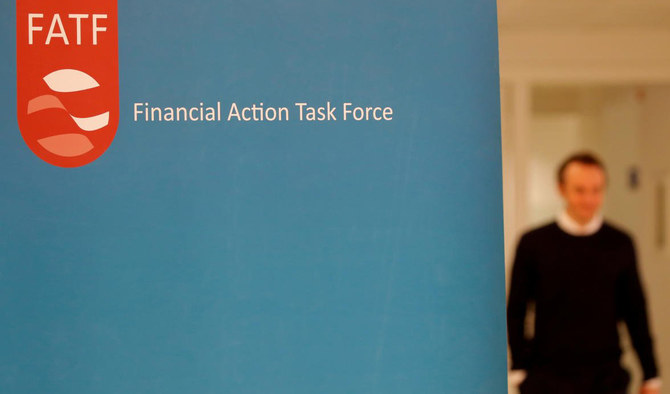
- The country will discuss progress made on 22 action points while claims to have complied with five
- The three-day talks come ahead of global watchdog’s plenary session in February
Saudi business delegates to soon visit Pakistan, help expedite economic cooperation — PM Sharif
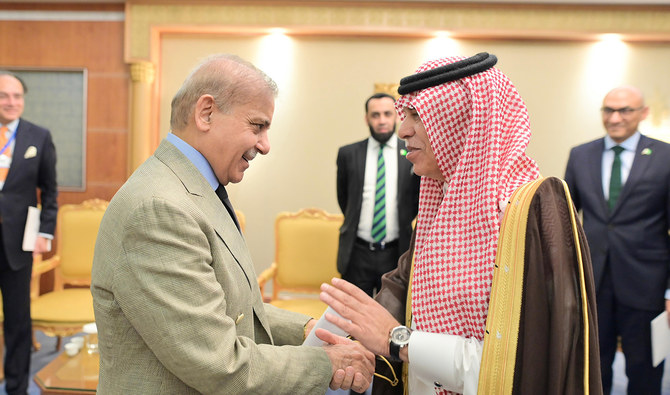
- Pakistan is currently making rigorous efforts to attract investment from Saudi Arabia, other Gulf nations to support dwindling economy
- PM Shehbaz Sharif expresses resolve to work hard to implement consensus achieved in meetings with Saudi leadership on WEF sidelines
ISLAMABAD: Prime Minister Shehbaz Sharif said on Tuesday that a delegation of Saudi businessmen would soon visit Pakistan, which would help expedite economic cooperation between the two brotherly countries.
The statement came at the end of PM Sharif’s visit to Riyadh, where he attended a two-day World Economic Forum (WEF) summit on Global Collaboration, Growth and Energy for Development on April 28-29.
On the sidelines of the summit, the prime minister held meetings with Crown Prince Mohammed bin Salman as well as Saudi ministers of energy, economy and planning, and environment, water, and agriculture.
Sharif, upon the completion of his visit, said bilateral relations and economic partnership between Saudi Arabia and Pakistan were getting “stronger and stronger.”
“A delegation of businessmen from Saudi Arabia is visiting Pakistan in the next few days,” he was quoted as saying in a statement issued from his office.
“The speed of economic partnership between the two countries will be accelerated by the visit of the Saudi Arabian businessmen.”
He expressed his resolve to work hard to implement the consensus achieved at the leadership level between the two countries, saying that a record number of delegations had been exchanged between Pakistan and Saudi Arabia during the past two months.
“His Excellency Crown Prince Mohammed bin Salman issued special instructions to Saudi ministers regarding Pakistan, for which we are extremely grateful,” Sharif said.
“I also pay tribute to Saudi ministers, who made full preparations for the implementation of the consensus between the leadership [of the two countries].”
Pakistan and Saudi Arabia enjoy strong trade, defense and cultural ties. The Kingdom is home to over 2.7 million Pakistani expatriates and serves as the top source of remittances to the cash-strapped South Asian country.
Both countries have been closely working to increase bilateral trade and investment deals, and the Kingdom recently reaffirmed its commitment to expedite an investment package worth $5 billion.
Czechoslovakian software company to invest $1 million in Pakistan data center

- IceWarp officials says the company plans to open subsidiary in Saudi Arabia after establishing presence in Pakistan
- The Czech company offers cost-effective services, including hosted email, TeamChat and ChatGPT integration
KARACHI: A Czechoslovakia-based software company is all set to invest about $1 million in Pakistan to set up a data center, said one of the top organization officials on Tuesday while also highlighting plans to launch a subsidiary in Saudi Arabia.
Established in 1998, IceWarp has presence in more than 100 countries and provides specialized and highly cost-effective services, such as hosted email, TeamChat, ChatGPT integration and online conferences etc.
“Pakistan is a high potential land where digital transformation can be seen from public sector entities to private businesses,” Jan Urbik, IceWarp’s global chief sales officer, told a news conference in Karachi. “We will support Pakistan in its mission to adopt digitalization through affordable solutions.”
Urbik said his company would set up a data center in Pakistan in compliance with the local regulations requiring companies to keep the data and privacy of Pakistani citizens within the country’s borders.
“IceWarp will offer solutions that are 60 percent more cost-effective than other software companies, along with enhanced applications and cybersecurity features that will attract a number of industries, financial institutions, small and medium enterprises (SMEs) and startups to use our services,” he added.
He mentioned the launch of the data center and full fledge operations with an investment of about $1 million in the country to set up a local subsidiary in collaboration with Hexalyze, a Pakistani company.
IceWarp, which has presence in the United Arab Emirates (UAE), is also planning to set up a subsidiary in Saudi Arabia.
“During the summer time, we visited Saudi Arabia and we have been to [the] LEAP [technology conference] and we have been talking with multiple partners,” Urbik said, adding that local entities told him that his company was welcome in the kingdom.
“So, Saudi Arabia is in our head as the future possibility to open the subsidiary there as well,” he continued.
Syed Saad Shah, CEO of Hexalyze, informed that IceWarp was planning to set up its regional office in Pakistan in collaboration with his company.
“The Czechoslovakia-based software company will expand its operations in the Kingdom of Saudi Arabia and the United Arab Emirates with separate data centers in these countries while the Pakistan office will serve as the back-up support station for marketing and sales,” Shah said.
The cost-effective corporate email solutions will enable hundreds of companies in Pakistan to adopt this tech-based solution in their businesses for the first time, he continued.
“On the other hand, corporate customers will not only save money from the expenses of enterprise services, but these companies will also save precious foreign exchange for the country by paying less to the service provider,” he added.
Present in the UAE, Saudi Arabia, Australia and Pakistan with global alliance partners, Pakistan’s IT company Hexalyze has been providing integration of tech solutions to SMEs as well as large enterprises since 2014.
Pakistan receives final tranche of $1.1 billion as part IMF loan program — central bank
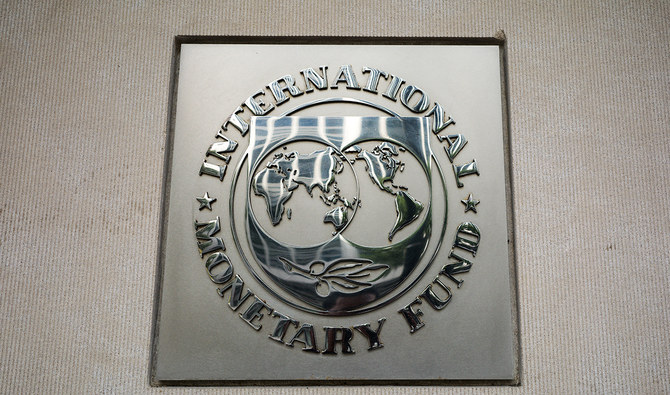
- The IMF executive board completed the second review of the $3 billion loan program in its meeting on Monday
- The approval came a day after PM Sharif’s meeting with IMF Managing Director Kristalina Georgieva in Riyadh
ISLAMABAD: Pakistan has received a final tranche of $1.1 billion as part of a $3 billion International Monetary Fund (IMF) loan program it entered last summer, the central bank said on Tuesday.
The IMF executive board completed the second review of the Stand-by Arrangement (SBA) in its meeting on Monday and approved the disbursement of SDR 828 million ($1.1 billion) for Pakistan, according to the State Bank of Pakistan (SBP).
The approval came a day after Pakistan Prime Minister Shehbaz Sharif discussed a new loan program with IMF Managing Director Kristalina Georgieva on the sidelines of a World Economic Forum (WEF) meeting in the Saudi capital of Riyadh.
“SBP has received SDR 828 million (around $ 1.1 billion) in value 29 Apr 2024 in its account from IMF,” the central bank said in a statement. “The amount shall be reflected in SBP’s foreign exchange reserves for the week ending on 3rd May 2024.”
Pakistan secured the $3 billion IMF program in June last year, which helped it avert a sovereign default. Islamabad says it is seeking a new loan over at least three years to help achieve macroeconomic stability and execute long-overdue reforms.
Finance Minister Aurangzeb has said Islamabad could secure a staff-level agreement on the new program by early July, though he has declined to detail what size of the program it seeks. If secured, it would be Pakistan’s 24th IMF bailout.
The $350 billion South Asian economy faces a chronic balance of payments crisis, with nearly $24 billion to repay in debt and interest over the next fiscal year — three-time more than its central bank’s foreign currency reserves.
Pakistan’s finance ministry expects the economy to grow by 2.6 percent in the fiscal year ending in June, while average inflation for the year is projected to stand at 24 percent, down from 29.2 percent the previous fiscal year.
Gunmen kill a police officer assigned to protect polio workers in northwest Pakistan
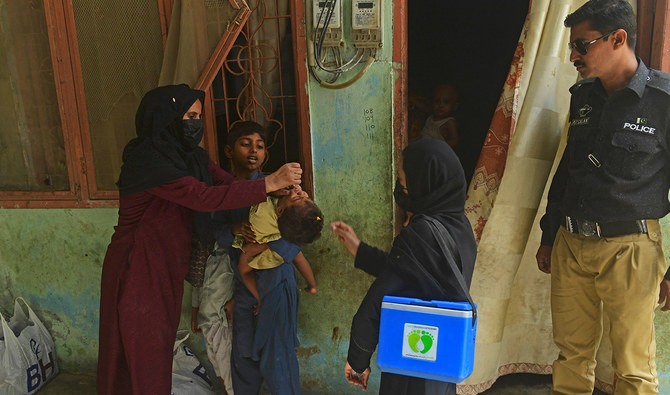
- At least 10 police have died this year while on security duty for vaccination campaigns in Khyber Pakhtunkhwa province
- Anti-polio campaigns in Pakistan are regularly marred by violence, with militants claiming campaigns sterilize children
PESHAWAR: Gunmen fatally shot a police officer assigned to protect polio workers in Pakistan’s northwest, an official said Tuesday.
At least 10 police have died this year while on security duty for vaccination campaigns in Khyber Pakhtunkhwa province.
The gunmen fired at a team working in Bajaur district, killing the officer on the spot, police officer Dilawar Khan said.
No one immediately claimed responsibility for the assault.
Anti-polio campaigns in Pakistan are regularly marred by violence. Militants target vaccination teams and police assigned to protect them, falsely claiming that the campaigns are a Western conspiracy to sterilize children.
A five-day anti-polio campaign started Monday in 13 high-risk districts of Khyber Pakhtunkhwa. More than 21,000 teams are tasked with administering vaccines to 4,423,000 children under age 5. More than 32,000 police are protecting the teams.
Pakistan and neighboring Afghanistan are the only countries where the spread of polio has never been stopped.
The potentially fatal, paralyzing disease mostly strikes children under age 5 and typically spreads through contaminated water.
Occupiers using ‘fake news’ against freedom struggles in Kashmir, Palestine — Pakistan’s UN envoy
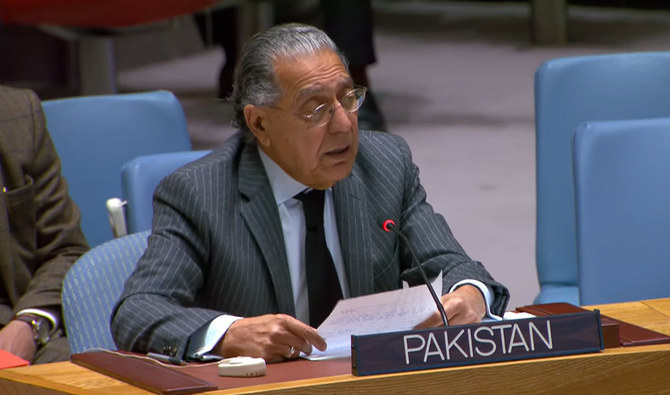
- Conflicts in Gaza and Ukraine have become key battlegrounds in an information war
- Online propaganda fighting to make people around the world take sides, harden positions
ISLAMABAD: Pakistan’s Permanent Representative to the United Nations, Ambassador Munir Akram, has said occupying powers were increasingly using fake news and disinformation campaigns to subdue freedom struggles in Kashmir and Palestine, state-run APP said on Tuesday.
The conflicts in Gaza and Ukraine have become key battlegrounds in an information war that goes far wider than their tightly drawn physical borders. Carefully crafted social media posts and other online propaganda are fighting to make people around the world take sides, harden their positions and even move broader public opinion.
While plenty of real imagery and accounts of the ensuing carnage have emerged, they have been intermingled with users pushing false claims and misrepresenting videos from other events.
“We are witnessing this today in the Gaza war and have witnessed this consistently in the case of occupied Jammu and Kashmir,” Akram told the UN Committee on Information on Monday, referring to online disinformation campaigns.
Akram voiced regret that the use of digital media was “turbocharging” the spread of disinformation “to promote Islamophobia to justify foreign occupation and aggression to turn victims of aggression into the culprits.”
This had led Pakistan to initiate a resolution on disinformation which was unanimously adopted last year, the Pakistani envoy said, adding that consultations would soon take place to advance its objectives.
“Pakistan would welcome the development of an inter-governmentally formulated code of conduct for information integrity on digital platforms,” Akram said, adding that the increasing use of AI tools to spread false information and conduct digital surveillance needed to be addressed.
“At the core of information manipulation, Internet blackouts, censorship and the use of special media laws by the occupation authorities is a sinister design to de-legitimize freedom struggles and perpetuate a climate of fear, intimidation and violence,” Akram added.
In some instances with regards to the Gaza war, online propaganda simply involves the framing of real events, violent images and videos, and hate speech to emphasize the guilt of one side and vindicate the other.
But much of the material relies on the creation of what’s commonly referred to as fake news, in the form of fabricated stories published on social media that repurpose or mislabel real photos or videos.
For example, one post on X (formerly Twitter) that was viewed 300,000 times used a photo of an accidental fire at a McDonald’s restaurant in New Zealand to falsely claim the company had been attacked by pro-Palestinian protesters for its perceived support of Israel. Despite being debunked, the story was still the focus of heated discussions on social media channels.
There are also reports of excerpts from video games and old TikToks being shared with claims they are from real current events in Gaza, and fake government agency social media accounts posting disinformation.










